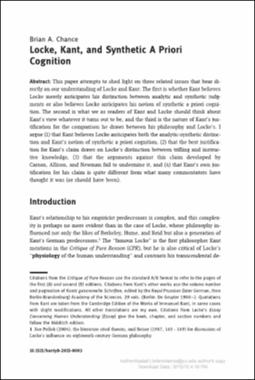| dc.contributor.author | Chance, Brian | |
| dc.date.accessioned | 2019-02-26T22:59:12Z | |
| dc.date.available | 2019-02-26T22:59:12Z | |
| dc.date.issued | 2015 | |
| dc.identifier.uri | https://hdl.handle.net/11244/317562 | |
| dc.description.abstract | This paper attempts to shed light on three related issues that bear directly on our understanding of Locke and Kant. The first is whether Kant believes Locke merely anticipates his distinction between analytic and synthetic judgments or also believes Locke anticipates his notion of synthetic a priori cognition. The second is what we as readers of Kant and Locke should think about Kant’s view whatever it turns out to be, and the third is the nature of Kant’s justification for the comparison he draws between his philosophy and Locke’s. I argue (1) that Kant believes Locke anticipates both the analytic-synthetic distinction and Kant’s notion of synthetic a priori cognition, (2) that the best justification for Kant’s claim draws on Locke’s distinction between trifling and instructive knowledge, (3) that the arguments against this claim developed by Carson, Allison, and Newman fail to undermine it, and (4) that Kant’s own justification for his claim is quite different from what many commentators have thought it was (or should have been). | |
| dc.title | Locke, Kant, and Synthetic A Priori Cognition | en_US |
| dc.type | Article | en_US |
| dc.description.peerreview | Yes | en_US |
| dc.description.peerreviewnotes | Journal practices double-blind peer review | en_US |
| dc.identifier.doi | 10.1515/kantyb-2015-0003 | en_US |
| ou.group | College of Arts and Sciences::Department of Philosophy | en_US |
